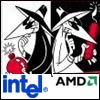August 23, 2005
AMD vs. Intel: the Abuse of Monopoly Power & a Dual-Core Chip Challenge
 The grudge-match between AMD and Intel continues - although AMD is the clear aggressor in all of it. This week, in a follow up to AMD's antitrust lawsuit over Intel's "abuse of monopoly power" the guantlet was thrown down for a mano-a-mano in dual core server processors:
The grudge-match between AMD and Intel continues - although AMD is the clear aggressor in all of it. This week, in a follow up to AMD's antitrust lawsuit over Intel's "abuse of monopoly power" the guantlet was thrown down for a mano-a-mano in dual core server processors:
Advanced Micro Devices Inc. on Tuesday (August 23) issued a challenge to Intel Corp. to conduct a head-to-head competition of dual-core server microprocessors.AMD's proposed dual-core duel would be a live, public performance evaluation between server platforms based on the dual-core Opteron 800 Series or 200 Series processors and the corresponding Intel product.
Should Intel accept AMD's challenge, the duel would take place at a public venue to be announced in the coming weeks, with testing conducted by a neutral, third-party testing lab.
"Since we launched Dual-Core AMD Opteron processors in April 2005, we've won every major industry-standard benchmark for x86 servers. AMD64 dual-core technology provides industry-leading performance, is easy to upgrade and is energy efficient," said Marty Seyer, corporate vice president and general manager of the Microprocessor Solutions Sector at AMD, in a statement.
"We are giving our competitor a fair and open opportunity to challenge our clear market leadership in a public setting,” he said. “The gauntlet has been thrown down, it is time to cut through the hype, and demonstrate who the industry's leader in x86 dual-core processing is today."
More interesting is that the existence of its monopoly isn't AMD's beef with Intel... it's the fact that they tried to maintain it:
AMD, he said, isn't suing Intel because Intel is a monopoly; it's suing Intel for abusing its monopoly powers to maintain its control of the market. I knew that a distinction of that kind existed, though I'm no lawyer. Still, I had never heard it put so succinctly.The less thoughtful among those inclined toward AMD portray Intel as a beastly megacorporation drunk with wealth and success that deserves to be taken down a peg. AMD's going to storm the castle walls, do or die, so three cheers for the underdog!
It's a pity that view has gotten so much visibility because pundits are mistaking this antitrust case as an effort by AMD to rouse the rabble against the company that's gotten too big.
Those inclined toward Intel tend to portray AMD as a feeble grower of sour grapes, a company with some smart technology that was, in the end, unable to capture the minds and dollars of the PC market during a fair fight. In capitalism, as in nature, there must be winners and losers, diners and dinners. There's no crying in business, and we can't champion those who run to court to protest whenever the market decides against them.
AMD isn't suing Intel for being too big, too profitable, or too stingy to share its wealth. I'm relieved that we're enjoying a respite from the '90s-era knee-jerk disdain for tech companies judged too large or too successful. The arbiters of "too" are always unable to quantify their criteria, but they know it when they see it. And when they see it, these judges of corporate proportionality set about making things right by trashing the player that, according to the secret formula, has more than it deserves.
Microsoft will always be the epitome of the megacorporate pincushion. Every time a Windows or Internet Explorer security hole was found or a Microsoft exec said something stupid, it was flogged as yet another reason for right-thinking people to wish Microsoft failure or harm.
A company or individual who has attained a certain level of success risks having sloppiness and poor decisions reframed as malicious deeds. I'd have no empathy for AMD if it were using the courts to compensate it for ending up with too little pie.
I do have empathy for AMD precisely because AMD isn't suing Intel for being too big, too successful, or too wily a competitor. The question for the court and, if it's not settled before trial, a jury is whether Intel misused the monopoly powers it has acquired to make sure that it maintains its lead. Did Intel come by its wealth and power earnestly? Is Intel in the leadership position in x86 CPUs through dirty dealing? That's worthwhile fodder for discussion, but in AMD v. Intel, Intel's size and success aren't the issue. The question at issue is much easier to define and decide: Did Intel break the law trying to hang onto its control of the PC processor market?
So, what do you think? Is that a valid argument against unfair competition?
- Arik
Posted by Arik Johnson at August 23, 2005 07:47 AM "Competitive Intelligence applies the lessons of competition and principles of intelligence to the need for every business to gain awareness and predictability of market risk and opportunity. By doing so, CI has the power to transform an enterprise from also-ran into a real winner, with agility enough to create and maintain sustainable competitive advantage."
"Competitive Intelligence applies the lessons of competition and principles of intelligence to the need for every business to gain awareness and predictability of market risk and opportunity. By doing so, CI has the power to transform an enterprise from also-ran into a real winner, with agility enough to create and maintain sustainable competitive advantage."
